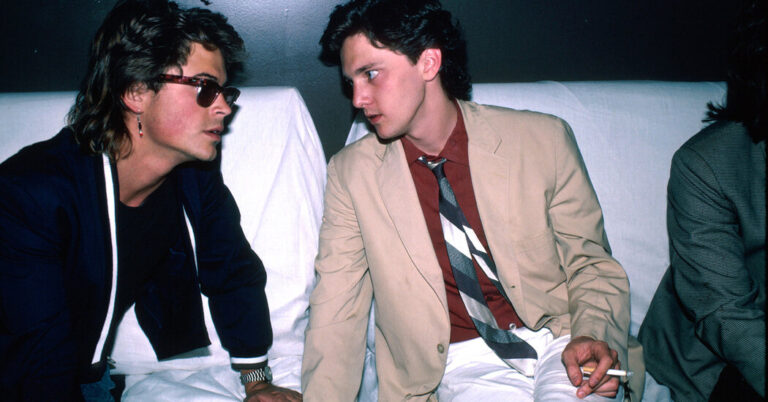When I was very young, I found success very quickly in a series of films. It was the 1980s and I was in the right place at the right time as a cultural shift was taking place.
It’s hard to imagine today, but Hollywood hasn’t always been as enamored with young people as it is today. But seemingly overnight, the direction of the films changed. Authors from the 70s would no longer dictate the type of entertainment we would watch. Hollywood had discovered the purchasing power of a young audience and refocused its lucrative tractor radius directly on them.
I and a group of other young actors were the beneficiaries of this shift, and our careers quickly flourished, which surprised no one more than us. There were some in the old guard who were unhappy with this upheaval, and when a disparaging speech article in New York magazine appeared grouping a group of us young actors under the name Brat Pack, many in Hollywood snickered with satisfaction. We had been put back in our place, brought back to our size.
People were eager to understand this cultural realignment, and the catchy turn of the phrase caught fire. The nod to Pack of rats placed us on a Hollywood historical continuum while reducing us by stripping us of our individuality. My career and that of half a dozen others have been forever marked. As the magazine says: “It’s the ‘Brat Pack’ of Hollywood.” It’s to the 1980s what the Rat Pack was to the 1960s: a traveling group of famous young stars looking for parties, women and good times.
We hated the tag. We were now members of a club that neither of us wanted to join. I felt like I had lost control of the narrative of my career overnight. I tried to ignore the Brat Pack label, hoping it would go away. But I didn’t understand something.
Even though I might have found the term derogatory and demeaning, the young people of my generation loved it. Being part of the Brat Pack meant I was one of the coolest kids, the ones you wanted to hang out with, emulate; we were the ones you admired.
There was never an accurate accounting of the players who made up the Brat Pack, but that is largely irrelevant. The Brat Pack has always been more of an idea than a fixed reality. And it marked a generation.
For years, the disconnect between what I experienced and what the public felt created an uneasy alliance. The Brat Pack label preceded me into every room I entered. I dragged him behind me like a carcass of youth. Then, a few years ago, I wrote a book about that time and discovered that something had happened when I wasn’t looking. I had learned not only to accept the Brat Pack label, but to view it with deep affection. Turns out I had been looking through the wrong side of the telescope, and when I turned it, the view was vast.
People have approached me on the street for decades to quote passages from these films or to express how much they meant to them. Many people have spoken about their own youth about these films. These are the people who taught me the most. I finally understood that I and the other members of the Brat Pack represented this exciting time of transition where life was a blank slate to write on, where possibilities were just a step on the horizon. We had become the avatars of youth for a certain generation.
During that heady and confusing period of the 1980s, the great French director Claude Chabrol said to me: “My dear boy, the truth of today is not the truth of tomorrow. » For so long I didn’t understand what he meant, but maybe now I do. Something that had cast such a long shadow over me, that I felt had obscured my identity and even obscured my sense of self, had turned into something of a blessing. It was a gift I could give to others by simply accepting their affection.
I began to wonder about the experiences of the other members of the Brat Pack, most of whom I hadn’t seen in decades. Had their perspective on the events of so long ago changed in the same way? I had the idea that since the Brat Pack came about entirely because of its relationship with cinema, maybe I could film the meetings.
A few members of the pack were reluctant to participate, but with the majority doing so, our reunion was pleasant. Gone is the competitive and anxious aspect of youth. What remained was the mutual gratitude and affection of a survivor.
But something else happened during these meetings: in reviving and sharing experiences from our long-frozen past, much of the detritus of that era revealed itself as a ghost that collapsed , allowing the Brat Pack to relive the experience in the present. . The truth of the past has given way to the truth of today. No longer an ancient albatross, the Brat Pack had been transformed over time into something to be celebrated by us as the cultural touchstone that it was, something to be looked at at last with shared, perplexed affection – re-examined and embraced with something. similar to wonder.


